|
|
|
Sort Order |
|
|
|
Items / Page
|
|
|
|
|
|
|
| Srl | Item |
| 1 |
ID:
093206


|
|
|
|
|
| Publication |
2009.
|
| Summary/Abstract |
The 2007 U.S. Attorney firing scandal raised the specter of political bias in the prosecution of officials under federal corruption laws. Has prosecutorial discretion been employed to persecute enemies or shield allies? To answer this question, I develop a model of the interaction between officials contemplating corruption and a prosecutor deciding whether to pursue cases against them. Biased prosecutors will be willing to file weaker cases against political opponents than against allies. Consequently, the model anticipates that in the presence of partisan bias, sentences of prosecuted opponents will tend to be lower than those of co-partisans. Employing newly collected data on public corruption prosecutions, I find evidence of partisan bias under both Bush (II) and Clinton Justice Departments. However, additional evidence suggests that these results may understate the extent of bias under Bush, while overstating it under Clinton.
|
|
|
|
|
|
|
|
|
|
|
|
|
|
|
|
| 2 |
ID:
093215


|
|
|
| 3 |
ID:
093228
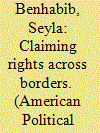

|
|
|
|
|
| Publication |
2009.
|
| Summary/Abstract |
The status of international law and transnational legal agreements with respect to the sovereignty claims of liberal democracies has become a highly contentious theoretical and political issue. Although recent European discussions focus on global constitutionalism, there is increasing reticence on the part of many that prospects of a world constitution are neither desirable nor salutary. This article more closely considers criticisms of these legal transformations by distinguishing the nationalist from democratic sovereigntiste positions, and both, from diagnoses that see the universalization of human rights norms either as the Trojan horse of a global empire or as neocolonialist intentions to assert imperial control over the world. These critics ignore "the jurisgenerativity of law." Although democratic sovereigntistes are wrong in minimizing how human rights norms improve democratic self-rule; global constitutionalists are also wrong in minimizing the extent to which cosmopolitan norms require local contextualization, interpretation, and vernacularization by self-governing peoples.
|
|
|
|
|
|
|
|
|
|
|
|
|
|
|
|
| 4 |
ID:
093217
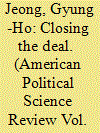

|
|
|
| 5 |
ID:
093222
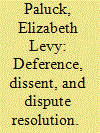

|
|
|
| 6 |
ID:
093219
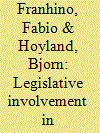

|
|
|
|
|
| Publication |
2009.
|
| Summary/Abstract |
In parliamentary systems, the need to preserve the political agreement that sustains the executive often motivates legislative involvement in policymaking. Institutional arrangements regulating executive-legislative relations and ministerial autonomy also structure parliamentary participation. However, empirical evidence of these effects remains limited to a few policies and countries. European Union legislation provides the opportunity to test expectations about legislative involvement for different types of measure across various institutional arrangements, across multiple policy areas, and across time. In this article, we investigate legislative involvement in the transposition of 724 directives in 15 member states from 1978 to 2004. Our results confirm that involvement increases as conflict between the responsible minister and her coalition partners intensifies. The discretionary scope embedded in the directive further inflates this effect. Additionally, parliamentary involvement decreases as the government's institutional advantage over the legislature increases, especially if intracoalitional conflict deepens.
|
|
|
|
|
|
|
|
|
|
|
|
|
|
|
|
| 7 |
ID:
093205
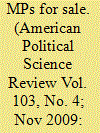

|
|
|
|
|
| Publication |
2009.
|
| Summary/Abstract |
Many recent studies show that firms profit from connections to influential politicians, but less is known about how much politicians financially benefit from wielding political influence. We estimate the returns to serving in Parliament, using original data on the estates of recently deceased British politicians. Applying both matching and a regression discontinuity design to compare Members of Parliament (MPs) with parliamentary candidates who narrowly lost, we find that serving in office almost doubled the wealth of Conservative MPs, but had no discernible financial benefits for Labour MPs. Conservative MPs profited from office largely through lucrative outside employment they acquired as a result of their political positions; we show that gaining a seat in Parliament more than tripled the probability that a Conservative politician would later serve as a director of a publicly traded firm-enough to account for a sizable portion of the wealth differential. We suggest that Labour MPs did not profit from office largely because trade unions collectively exerted sufficient control over the party and its MPs to prevent members from selling their services to other clients.
|
|
|
|
|
|
|
|
|
|
|
|
|
|
|
|
| 8 |
ID:
093226


|
|
|
|
|
| Publication |
2009.
|
| Summary/Abstract |
This article investigates the nature of the linkages between trade and labor rights in developing countries. Specifically, we hypothesize that a "California effect" serves to transmit superior labor standards from importing to exporting countries, in a manner similar to the transmission of environmental standards. We maintain that, all else being equal, the labor standards of a given country are influenced not by its overall level of trade openness, but by the labor standards of its trading partners. We evaluate our hypothesis using a panel of 90 developing countries over the period 1986-2002, and we separately examine the extent to which the labor laws and the actual labor practices of the countries are influenced by those of their export destinations. We find that strong legal protections of collective labor rights in a country's export destinations are associated with more stringent labor laws in the exporting country. This California effect finding is, however, weaker in the context of labor rights practices, highlighting the importance of distinguishing between formal legislation and actual implementation of labor rights.
|
|
|
|
|
|
|
|
|
|
|
|
|
|
|
|
| 9 |
ID:
093224


|
|
|
|
|
| Publication |
2009.
|
| Summary/Abstract |
Every dictator dislikes free media. Yet, many nondemocratic countries have partially free or almost free media. In this article, we develop a theory of media freedom in dictatorships and provide systematic statistical evidence in support of this theory. In our model, free media allow a dictator to provide incentives to bureaucrats and therefore to improve the quality of government. The importance of this benefit varies with the natural resource endowment. In resource-rich countries, bureaucratic incentives are less important for the dictator; hence, media freedom is less likely to emerge. Using panel data, we show that controlling for country fixed effects, media are less free in oil-rich economies, with the effect especially pronounced in nondemocratic regimes. These results are robust to model specification and the inclusion of various controls, including the level of economic development, democracy, country size, size of government, and others.
|
|
|
|
|
|
|
|
|
|
|
|
|
|
|
|
|
|
|
|
|